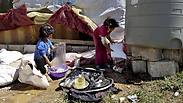
Jewish cultural icons make plea for Syria refugees
Neil Gaiman and Harvey Weinstein visit refugee camp in Jordan as part of project to support Syrians driven from their homes by bloody three-year conflict.
When famed fantasy giant Neil Gaiman writes with passion, the reader can feel it all the way down to their toes. But perhaps the most powerful prose of his illustrious career has been in recent days, in his account of a trip he made to a Syrian refugee camp in Jordan with fashion designer Georgina Chapman, who brought along her husband, Hollywood heavyweight Harvey Weinstein.
Gaiman, a British-born Jew, explains that he was in Jordan at the invitation of the United Nations' refugee agency (UNHCR), who recruited him after realizing how much attention was given to his tweets about the Syrian refugees. He in turn recruited Chapman. The two are now working on a "storytelling project highlighting the Syrian refugee crisis."
Related stories:
- Celebrities press UN on Palestinian refugees in Syria
- Idris Elba, Banksy make emotional plea to end Syria crisis
"I realize I have stopped thinking about political divides, about freedom fighters or terrorists, about dictators and armies," Gaiman writes in his account of the trip for the Guardian newspaper.
"I am thinking only of the fragility of civilisation. The lives the refugees had were our lives: they owned corner shops and sold cars, they farmed or worked in factories or owned factories or sold insurance. None of them expected to be running for their lives, leaving everything they had because they had nothing to come back to, making smuggled border crossings, walking past the dismembered corpses of other people who had tried to make the crossing but had been caught or been betrayed.
The account paints a picture of people determined to carry on in the face of unspeakable acts of violence, massive loss and overwhelming terror.
"We watch how, in Zaatari camp, people make lives, build a new normality as best they can," he writes. "There are even shops: we eat the best baklava we have ever tasted in a bakery jerry-rigged from a container and a tent, rolled out on a metal table with a broomhandle. Harvey wanders off, and I find him outside, talking with an old woman who lost her sons in the conflict, but made it to Jordan with her pregnant daughter. We ask who killed her sons, and she tells us she doesn't know.
"It is a refrain we hear over and over, but we keep asking the questions, as people tell us how they came to the camps: Who bombed your house? Who shot you in the back as you drove on your motorbike to dig your children out of the rubble? Who cut off your cousin's head? Who killed your family? Who shot your son? Who cut off the food supplies? Who shot at you if you went out of your house? Who beat you up? Who broke your hand?
"People shrug. They don't know."
Gaiman admits that he was taken by surprise at the scale of aid program dealing with the refugee crisis.
"Before I came out here, I tried to imagine what a refugee camp would be like. It would consist of several rows of tents in a field. It would be dusty, of course, because the field was in Jordan, where it is dry, and it would be a big field, because there were a lot of refugees. I had not imagined cities."
Gaiman, Chapman and Weinstein are the latest in a series of other celebrities who are working to draw attention to the plight of Syrians after more than three years of conflict in Syria. In March, British artist Banksy and actor Idris Elba produced a video to mark the third anniversary of the crisis. More than 100,000 people have been killed since the conflict began in 2011, and millions have fled the war-torn country.










